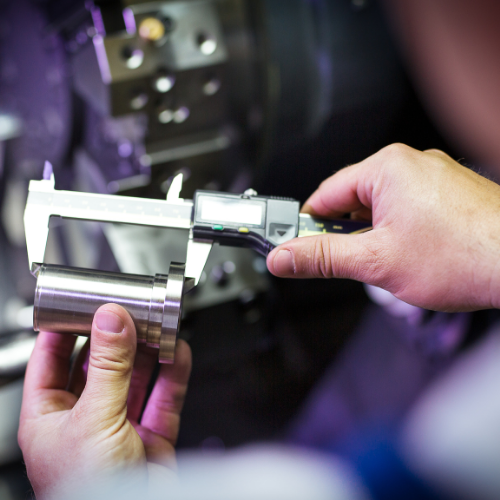Does Your ERP Speak MFG?
Manufacturers come to CIMx Software with critical manufacturing issues and need solutions to the problems holding back their business. After digging...

This summer, we’re revisiting a series on how to buy a manufacturing software platform. We’re also addressing why you need one and the different trends we see in the problems that people bring to us. Patterns in the data suggest that each of the issues manufacturers have, almost regardless of industry, relate to multiple areas of a Manufacturing Execution System (MES) solution; their issue is usually seeing those connections.
For instance, someone who says they can’t ship on time or refers more specifically to orders in the aisles in various states of completion may not be able to or know how to trace these issues back to their sources in inventory, instructions, or non-conforming work. They also may not be able to push these issues forward to understand the implications beyond a customer complaining that their order is not received on time.
A manufacturing shop floor is an intricate network of processes, people, workstations, machines, tools, parts, materials, and time. It is your money moving through all the areas of your shop and you must keep it flowing smoothly to reduce the overall costs.
If you have kids, they are probably working a summer job right now. Many of them may have found jobs in the service industry. Restaurants near where we live were all looking for people and where jobs may have been harder to get years ago, they were plentiful this year. COVID arguments aside, the labor market is shifting. In a typical year, the hostess job may not have been seen as the top job, but that position wields a lot of power.
The host or hostess knows the restaurant floor, which tables are occupied, which will be finishing soon, and what people are waiting to be seated. They are also a possible connector for take-out orders. More than anyone in the restaurant, they can tell you what they expect to happen in the next 15 minutes. They have enough information about the big picture to make decisions in the near term to support the best path. A large group that needs to be seated is an exercise of moving parts; how long should they wait to get the best table set up, assuming they will need to push several smaller ones together?
Similarly, on your shop floor, you have at least one person in your shop who has that big picture of the shop floor. They know which machines seem the busiest today, what orders need to be done and they may have some view as to which jobs will finish on time and ship today. They may be the same person that decides which internal jobs need to be run today for sub-assemblies in a parts shop and smaller builds that you may stock for use or sale later, or for orders using recipes with ingredients that are available or about to expire.

We refer to this person as the Production Control Manager or Production Manager. While they may have a different title at each manufacturer we work with, they commonly perform the same work across manufacturers. They plan, communicate, and troubleshoot work to specific work centers, from specific orders, and to specific people. They are the eyes and ears of the shop floor. The Production Control Manager needs the right information to make decisions inside each moment, as things unfold.
Like the hostess, their choices may not bring down the shop floor with a bad choice, but they and the rest of production will feel the heat of it later. Moving work from one work center to another may solve an issue right now, but later today or tomorrow, they may find that work center availability across the shop floor accordioned out where an associated piece of work in the process is waiting to be complete.
Conversely, the hostess can be the most powerful use of knowledge and information you have. Think about a time you went to a restaurant that really moved smoothly – one where you barely noticed that the hostess or maître d' checked availability before seating you. They knew everything they needed to before even taking your request; perhaps they noticed the size of your party and “read the room” before seating you.
On your shop floor, the Production Manager, given the right information, can serve the same function. Your job is to make sure they have the tools to get that information. How are you doing on that today? Do you know what information is most critical for them?
While every manufacturing company is a little bit different in the way they do work, there are a few critical components of that “front door” job – the Production Manager – that every single one of them needs. It starts with data. Below is a list that names, just the basics of what you need to really do the job right.
Some of these are more difficult than others to do on separate reports or paper (spreadsheets, ERP, finance system, or MS-suite). Inventory decrementation is a great example of this. If you’re using an ERP, MRP, or financial system to help you with manufacturing, it likely decrements inventory at the initiation of the order or when the work is done. In either case, your inventory is wrong during the entire duration of the job. If you decrement inventory at the start of a job for a quantity of 10 of something, your inventory shows 10 less than you have on the shelf as it’s not yet been used. If it decrements at the conclusion of the order, your inventory still shows that 10 as available and you will be overpromising on other work that uses that same inventory. These differences show the incredibly complex set of connective calculations that happen in a true manufacturing system.
Once you have the data you need, you need to be able to communicate it throughout the organization. This combination of data acquisition and communication, to us, is the heart of an Industry 4.0 shop.
As always, we’re here to move the conversation forward with you. If things we’ve said pique your interest in what’s possible for your shop, reach out and ask us the questions that you have. We’ve been doing this for more than 25 years and we’re happy to share our insight with you.
Over the course of this project, we will identify critical issues we see, what’s causing them, and what you can do to stop them. We’ll go through almost 20 areas before we end this series on how to buy a system. These pieces should serve as a step-by-step guide to get you there.
Anxious to get the information faster? Engage with us for a Process Gap Analysis of your shop. We’re only an email away, info@cimx.com.
Contact CIMx Software to see how a Manufacturing Execution System can improve production control for you.

Manufacturers come to CIMx Software with critical manufacturing issues and need solutions to the problems holding back their business. After digging...

It’s not often that we quote ancient Greek playwrights, but this morning I’m thinking about Sophocles. One of the 3 greatest Greek tragedy writers...

This week, a neighbor's landscaping project got me thinking about how important it is to have the right structure in place to complete work correctly...